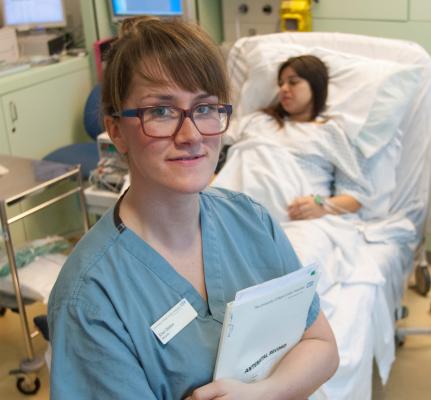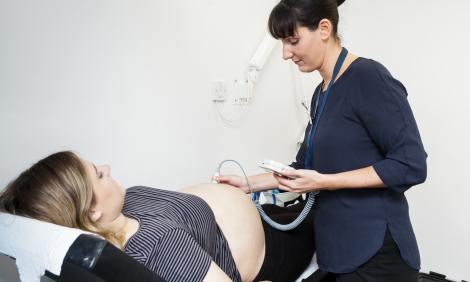Midwife
Midwives provide care and support to women and their families while pregnant, throughout labour and during the period after a baby’s birth.
Working life
You’ll mainly deal with pregnant women requiring professional support and advice. You are likely to be the lead health professional and contact for a woman, providing evidence-based information and helping her make informed choices about the options and services available throughout her pregnancy.
You’ll be the expert on childbirth and your responsibilities are likely to be diverse. You’ll:
- provide full antenatal care, including parenting classes, clinical examinations and screening
- identify women with complex needs
- monitor women and support them during labour and the birthing process
- teach new and expectant mothers how to feed, care for and bathe their babies
You could be working with women from a variety of backgrounds and you will need to be confident enough to communicate with different people. Some women and their families might be homeless, socially excluded, have disabilities or be very young. Other clients may be from certain cultural or religious backgrounds.
All women will need you to understand the emotional, physical and psychological processes of pregnancy and birth. Sometimes pregnancies do not go to plan and you will need to offer support and advice on stillbirth, miscarriage, termination, neonatal death and neonatal abnormalities.
If you are working as a community midwife, you are likely to develop good professional relationships with your families, which can make counselling easier at difficult times.
Eleri Bates
Midwife
Read Eleri's storyExperiencing the birth of a baby as part of your day job is incredible.

Entry requirements
To become a midwife you’ll need to train and study for an undergraduate degree or postgraduate degree or diploma, or secure a place on a midwifery degree apprenticeship. Entry requirements vary depending on where you’d like to study or work. However, they usually look for a minimum of:
- five GCSEs at grade 9-4/C or above - typically including English language or literature and a science subject
- and either two or three A-levels or equivalent qualifications such as GNVQ advanced level or NVQ level 3
A degree standard apprenticeship in midwifery is also available. To get onto a degree apprenticeship, you will need to apply for an apprentice position with a healthcare provider.
Must have skills
Don’t forget - academic qualifications aren’t everything. Excellent communication and people skills are crucial as you'll need to answer questions and offer advice. You must be happy to work as part of a team and be able to deal with emotionally charged situations. You'll need to also have an interest in the physical, psychological and process of pregnancy and birth
Annual payments
If you're eligible, you'll be entitled to receive at least £5,000 a year towards your studies while at university. Your personal circumstances may mean you could receive more. And the good news? You'll never have to pay it back. Find out more.
Pay and benefits
Your standard working week will be around 37.5 hours on shift pattern which can include nights, early starts, evenings, weekends and bank holidays. As a midwife, you’ll be paid on the Agenda for Change (AFC) pay system, typically starting at band 5. There are opportunities to progress to positions at band 6 as a team manager and to midwife consultant at bands 8b-8c.
You’ll also have access to our generous pension scheme and health service discounts, as well as 27 days of annual leave plus bank holidays.
Where will I work?
Midwifery services are increasingly moving from hospitals to the community, so where you work could reflect this. Antenatal care in the community is provided in women’s homes, local clinics, children’s centres and GP surgeries. It can also be provided in hospitals where you may work in triage and assessment areas, high and low risk labour, postnatal wards and neonatal units. Care during labour is provided in a mother’s home, as well as midwifery led maternity units.
You’ll work with a range of other professionals including gynaecologists, GPs, health visitors, neonatal nurses and maternity support workers.
Training and career development
You'll need to be committed to learning and always keeping their skills and knowledge up to date. Once you have qualified as a midwife, there are a wide range of opportunities. You may want to undertake further training and become a health visitor or move into management, teaching or clinical research.
Displaying 6 - 10 of 93 matches
-
Midwifery
University of Salford
View courseOpens in a new window
- Qualification
- Bachelor of Science (with Honours) - BSc (Hons)
- Study mode
- Full-time
- Duration of the course
- 3 Years
- Leading to a career in
- Midwifery
- Contact details
- [email protected] 0161 295 4545
- Region
- North West
- Admissions address
- The Crescent
Salford
M5 4WT
United Kingdom
-
Midwifery
Keele University
View courseOpens in a new window
- Qualification
- Bachelor of Science (with Honours) - BSc (Hons)
- Study mode
- Full-time
- Duration of the course
- 3 Years
- Leading to a career in
- Midwifery
- Contact details
- [email protected] 01782 679600
- Region
- West Midlands
- Admissions address
- Keele University
Keele
ST5 5BG
United Kingdom
-
Midwifery
University of York
View courseOpens in a new window
- Qualification
- Bachelor of Midwifery (with Honours) - BMid (Hon)
- Study mode
- Full-time
- Duration of the course
- 3 Years
- Leading to a career in
- Midwifery
- Contact details
- [email protected] 01904 324000
- Region
- Yorkshire and The Humber
- Admissions address
- Heslington
York
YO10 5DD
United Kingdom
-
Masters in Midwifery
Edinburgh Napier University
View courseOpens in a new window
- Qualification
- Master of Science - MSc (PG)
- Study mode
- Full-time
- Duration of the course
- 3 Years
- Leading to a career in
- Midwifery
- Contact details
- [email protected] +44 (0)333 900 60 40
- Region
- Scotland
- Admissions address
- Sighthill Campus
Bankhead Avenue
Edinburgh
EH11 4DE
United Kingdom
-
Midwifery
Edinburgh Napier University
View courseOpens in a new window
- Qualification
- Bachelor of Midwifery - BMid
- Study mode
- Full-time
- Duration of the course
- 3 Years
- Leading to a career in
- Midwifery
- Contact details
- [email protected] +44 (0)333 900 60 40
- Region
- Scotland
- Admissions address
- Sighthill Campus
Bankhead Avenue
Edinburgh
EH11 4DE
United Kingdom





